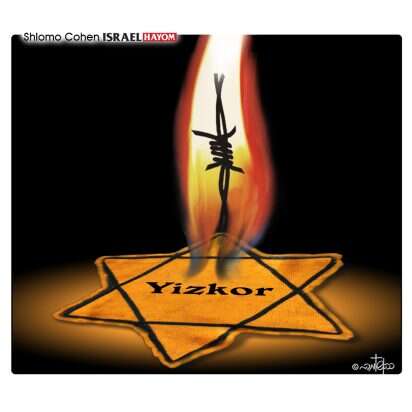The Holocaust happened outside of Europe too
It is almost certain that a similar level of extermination to that witnessed in Europe would have swept across North Africa if the allies had not been eventually successful in their advance. Moreover, the violent dispossession and deportation of the majority of the Muslim world’s Jewish populations from 1948 proves that an existing Nazi empire was not required to continue the legacy of its guiding ideology: violent antisemitism. But why are these facts so often brushed under the figurative rug? In the case of the Arab and Muslim world, there is not just a lapse of memory, but a deliberate effort to obscure the role of non-European actors in the Holocaust.1915 Armenian Genocide persecuted Yishuv Jews, as well
As Journalist Lyn Julius — herself of Iraqi-Jewish heritage — highlighted in a 2015 piece on the topic: “The myth of the Arabs as innocent bystanders, who had no responsibility for the Holocaust — and indeed, paid the price for a European crime when Israel was established — is widely believed.” Indeed, works such as Professor Gilbert Achcar’s “The Arabs and the Holocaust” have gone to great lengths to whitewash the complicity of leading Muslim figures such as Fawzi al-Qawuqji, Rashid Ali al-Kelani, Abu Ibrahim al-Kabir, Hassan Salama and Arif Abd al-Raziq and administrations with the Third Reich.
This could not be further from the truth. The Grand Mufti of Jerusalem, Haj Amin al-Husseini for example, played a central role in plotting the pro-Nazi coup in Iraq. He organised the killing of 12,600 Bosnian Jews by Muslims recruited to the Waffen-SS Nazi-Bosnian division by his own intervention. He also barred 4,500 Jewish refugees from exiting Europe and had them sent to Auschwitz and gassed; prevented another 2,000 Jews from leaving Romania and 1000 from leaving Hungary for Palestine. They too were sent to death camps.
Furthermore, although it is clear that the direct occupation of German, French and Italian forces played a huge role in the atrocities against North Africa’s Jews, this does not account for the extensive attempts at collaboration between Muslim leaders and the Nazis against their alleged “common enemies” of Communism, Zionism and the West. Nor does it explain away the Nuremberg-worthy laws imposed on Jews after the collapse of Nazism, nor the fact that Mein Kampf remains a long-standing bestseller in Turkey, Bangladesh and Afghanistan. Not to mention that Iraq’s pro-Nazi coup in 1941 occurred a full nine years after its independence from British adminstration. This coup culminated in the Farhud (lit. violent dispossesion) pogrom of 1942, in which hundreds of Iraqi Jews were murdered, beaten and sexually assaulted thousands of miles away from the theatre of Nazi occupation and war — a tragedy that Israeli activist Hen Mazzig tirelessly works to raise awareness of, but one that was never mentioned in my over two decades in the British education system.
In failing to acknowledge the experiences of communities outside Europe and the complicity of non-western actors in the Holocaust, we fail to fully understand what was one of the most devastating and defining moments of the twentieth century, whose implications for the Jewish and non-Jewish world endure today. Although cooperation does seem to be growing in the wake of initiatives such as the Abraham Accords, the prevalence of grassroots antisemitism across the Muslim world is arguably the greatest barrier to peaceful coexistence between Israel and its neighbours. We cannot sensibly approach the present without acknowledging the past, however uncomfortable it may be. In order to honestly evaluate and improve relations between Israel and elements of its Muslim neighbours, we must accept a full picture of history, and abandon the perpetual canard of Israel and its Jews as innately privileged colonial oppressors, and the Arab world as wholly innocent victims of European interference.
April 24 marks the 106th anniversary of the 1915 Armenian Genocide by Ottoman Turkey. As the Auschwitz Institute for the Prevention of Genocide and Mass Atrocities notes, "On April 24 of 1915, leaders and intellectuals within the Armenian community of Constantinople were detained and interned. This event initiated a longer series of arrests that resulted in the imprisonment, relocation, and/or murder of countless notable Armenians across the Ottoman Empire over the course of the subsequent months. Soon thereafter, Ottoman authorities commenced internment, displacement, and deportation actions against the general Armenian population. For their part, Armenian men were most often put into servitude at a variety of forced labor camps before facing arbitrary executions. Women, children, and elderly members of the Armenian community, by contrast, were made to participate in 'death marches.' These forced marches led victims on protracted journeys through what is now the Syrian desert with many subjected to torture and rape in addition to death through attrition.
"While estimates on the total number of those who perished can vary, between 1,000,000 and 1,800,000 Armenians are known to have lost their lives as a result of the genocide. This number amounts to approximately 70% of the region's Armenian community. The scale and cruelty of the atrocities served as one of the principal inspirations for the creation of the word 'genocide' by Polish-Jewish lawyer Raphael Lemkin and, by extension, the 1948 Convention on the Prevention and Punishment of the Crime of Genocide."
A significant but widely unknown fact is that not only Greek and Assyrian Christians of Ottoman Turkey, but many Jews of pre-state Palestine were also targeted, persecuted and deported during the Armenian Genocide.
A thoroughly researched book by Dr. Andrew Bostom, The Legacy of Islamic Antisemitism: From Sacred Texts to Solemn History, exposes the persecution and mass expulsions that the Jewish population in Palestine endured as a result of the orders of Djemal Pasha, an Ottoman military leader. He was also one of the three Pashas who ruled the Ottoman Empire during World War I and organized the genocide. He writes:
"During World War I in Palestine, between 1915 and 1917, The New York Times published a series of reports on Ottoman-inspired and local Arab Muslim-assisted anti-Semitic persecution that affected Jerusalem and the other major Jewish population centers. For example, by the end of January 1915, seven thousand Palestinian Jewish refugees – men, women and children – had fled to British-controlled Alexandria, Egypt. Three New York Times accounts from January and February 1915 provide these details of the earlier period.
Six cold, hard, dry facts
Feelings are not enough. We are getting an overdose of feelings during this period, between Yom HaShoah (Holocaust Remembrance Day) and Yom Hazikaron (IDF and Terror Victims Memorial Day) We are getting saturated with stories, memories, and tears but, in my opinion, we must not neglect cold, hard, dry facts.19 years after Djerba synagogue bombing, Tunisian Jews again live in fear
Here, for starters, is a list of facts about the Shoah, courtesy of Professor Yosef Ben-Shlomo; six historical facts that we need to internalize in order to understand why the Holocaust was such an extraordinarily unique event: They will not only add to our understanding of the Shoah, but to our undedrstanding of the reasons for the sacrifice made by our fallen IDF soldiers.
1. Judenrein. For the first time in history (other than Haman’s plot against the Jews in ancient Persia), one nation sought the complete elimination of another, despite the fact that the vast majority of the nation targeted for extermination lived outside the territory of the aggressor nation. The goal was not to just put the other nation into exile but to erase it from the face of the earth. In Nazi documents on the number of Jews destined for death, even the tiny Albanian Jewish community of 200 souls was noted.
2. Absence of opposition. In the Wannsee Conference of January, 1942, the “final solution" was unanimously approved by the fifteen attendees, all of whom held high-ranking ministerial positions in the German government, and eight of whom were holders of doctorate degrees.
3. The Germans worked against their own interests in World War II. Even as Germany was losing the war, it behaved irrationally. Instead of investing in just fighting enemy forces, the Germans continued “to waste" energy on their Jewish extermination project.
4. They were not crazy. Among the murderers were family men and women, professionals, and intellectuals. They were perfectly sane. Millions of ordinary, regular folks did not see any problem with taking part in this giant extermination project.
5. The concentration camps were not bombed. The death factories continued to operate without interference from the Western allied nations or their armies, even while the allies regularly bombed Nazi munitions factories.
6. There was no way out. Unlike their ability to cope with other horrendous decrees and persecutions throughout history, the Jews of Europe had no way out. There was no possibility of saving themselves through cooperation with the enemy, or by being exiled or by conversion to another faith or bribes. Death was their only option.
Nineteen years ago precisely, on Apr. 11, 2002, there was a bombing at a synagogue in Djerba, Tunisia. A truck fitted with explosives blew up by the entrance of the El Ghriba synagogue, killing 21 people. Since then, the local Jewish community has lived in relative peace, that is until a few months ago when the police and local residents began to harass them, the Jewish residents claim.
"About a month and a half ago, the president of Tunisia [Kais Saied] accused Jews of terrible things, and then apologized and said that he is not against Jews in Tunisia," one Jewish resident, who chose to remain anonymous for fear of retribution from local authorities, said.
"Despite his apology, the Jews of Djerba have been suffering from antisemitism ever since. On Pesach, a 10-year-old boy, the grandson of [chief Tunisian] Rabbi Haim Bittan, was walking in the street when he was attacked by someone, for no logical reason.
"Last week, an 18-year-old Jewish girl was attacked by two men on motorcycles. They tried to strangle her, but when she screamed, the neighbors rushed to her help, and the motorcyclists fled.
"We are terrified. It is not simple to live this way. The police have changed their attitude, and they check us all the time, harass us, every time they enter our quarter they hounds us.
"One of the policemen, who saw my ID that states that I am Jewish, detained me for half an hour for no reason. They are really harassing us.
"Each time they enter our quarter, they ask us to stand on the sides. It reminds us of dark times, and we want this to stop. We are living in fear.






































.jpg)





